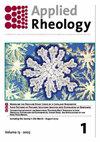温度对沥青粘结剂疲劳性能的影响
IF 5.8
4区 工程技术
Q1 MECHANICS
引用次数: 6
摘要
摘要沥青路面在其整个使用寿命中处于不同的气候条件下,这意味着疲劳开裂不是在特定的温度下发生的,而是在一定的温度范围内发生的。本文的主要目的是评估不同温度对两种沥青粘结剂的疲劳寿命的影响:非改性粘结剂(渗透等级30/45)和高度聚合改性粘结剂(HPMB)。采用动态剪切流变仪(DSR),在10、15、20、25和30℃的温度下,通过线性振幅扫描(LAS)测试进行了疲劳抗力表征。从动剪切模量(|G*|)结果来看,在较低温度(10℃)下,黏结剂与流变仪平行板之间存在黏附损失,而在较高温度(25℃和30℃)下,黏结剂与流变仪平行板之间存在塑性流动,而不是疲劳损伤。因此,考虑到实际试验程序没有规定试验温度,对失效机理的评价对于验证试验结果是必要的,因为随机选择试验温度可能导致数据不一致。本文章由计算机程序翻译,如有差异,请以英文原文为准。
Effect of temperature on the fatigue behavior of asphalt binder
Abstract Asphalt pavement is under different climatic conditions throughout its service life, which means that fatigue cracking does not occur at a specific temperature, but at a temperature range. The main objective of this paper is to evaluate the influence of different temperatures in the fatigue life of two asphalt binders: a non-modified binder (penetration grade 30/45) and a highly polymermodified binder (HPMB). The fatigue resistance characterization was performed by means of a linear amplitude sweep (LAS) test at the temperatures of 10, 15, 20, 25, and 30°C using a dynamic shear rheometer (DSR). From the dynamic shear modulus (|G*|) results, adhesion loss was observed between the binder and the rheometer parallel plate at the lower temperature of 10°C,while at higher temperatures (25 and 30°C) plastic flow was observed rather than fatigue damage. Therefore, considering that the actual test procedure does not specify the testing temperature, the evaluation of failure mechanism is essential to validate test results, because the random selection of test temperature might lead to inconsistent data.
求助全文
通过发布文献求助,成功后即可免费获取论文全文。
去求助
来源期刊

Applied Rheology
物理-力学
CiteScore
3.00
自引率
5.60%
发文量
7
审稿时长
>12 weeks
期刊介绍:
Applied Rheology is a peer-reviewed, open access, electronic journal devoted to the publication in the field of applied rheology. The journal provides the readers with free, instant, and permanent access to all content worldwide; and the authors with extensive promotion of published articles, long-time preservation, language-correction services, no space constraints and immediate publication.
 求助内容:
求助内容: 应助结果提醒方式:
应助结果提醒方式:


